#queer characters abound!!!
Note
Hi !
I just finished the brights sessions and in one of the episode D. Bright said that the atypical represented 4% of the world's population, and that let me wondering, considering that almost every atypical that we encounter in the serie is queer, what percent of the queer community is atypical ?
Apart from that, i love your show and all of the amazing character! I hope you have a great day !
Oooh GREAT question! Lemme do some quick math here...
Okay, according to my universe bible (which is pretty accurate, if not fully comprehensive, I'm sure there's stuff I forgot to write down), there are 29 known and named atypicals across the 7 seasons of the podcasts, excluding the Bright Sides (Season 5, the bonus episodes) and the three books (though there is some overlap) but including Frank Sawyer and Sadie Greenwood, who are, like...atypical-adjacent.
Of those 30 atypicals (presuming I counted correctly (does this post have enough parentheticals yet?)), 14 are definitely canonically queer in one way or another. So, by that logic, nearly half of the atypical population is queer! I have a feeling that number would go up if I were to go through and pull out all the folks from the books and the bonus episodes (which perhaps I will do someday but I don't know the orientation of all the bonus ep characters (bc they were created by other people) and pulling out characters from the books is always a mess because, uh, I do not outline lol) but I also don't know that I can say our little atypical population is fully representative of the global population's queerness? Like flocks to like, so perhaps this a somewhat self-selecting bunch, or maybe there really is just a very high correlation between being atypical and being queer. Dealer's (fanfic writer and headcanon-er's) choice!
Counts under the cut:
Known Atypicals:
characters who are canonically queer are bolded - these are characters who either have queer relationships or talk specifically about their identity. some folks on this list are straight (Frank, Sadie, Marley, Jackson, Blackwell, (though tbf, Sadie is the only person in the whole series who ever says they're straight I'm pretty sure, so who knows)), but there are plenty who we never say one way or another, so anything is possible!
Sam Barnes
Caleb Michaels
Chloe Turner
Frank Sawyer
Robert "Damien" Gorham
Mark Bryant
Rose Atkinson
Franklin "Frankie" Meeks
Sadie Greenwood
Ben Bernard
Oliver Ritz
Margaret "Mags" Densmore
Jackson Crawford
Jason "Marley" Beck
Seamus Blackwell
Michal Sharon
Helen
Sidney
Alice Michaels
Alice Rufie Jordan
Tobias Sitzer
Alexis
Neal
Cat
Cam
Vanessa Turner
Ira
Alex "Blaze" Chen
Maguerite
Sarai
#the bright sessions#character stats#queer characters abound!!!#also pls message me if any of this is incorrect#YES this is lauren yes I wrote this show#but especially with later characters I didn't create them all!#but god yeah of the original bunch#that's a lot of bi/demi people lol#bisexual people? in MY writing? it's more likely than you think#and you probably think its extremely likely#which just goes to show#also its funny so many of them have non-atypical partners#like the venn diagram of queer atypicals who have dated each other is NOT enormous and lo and behold#mark is literally the common denominator amongst all of them lol#......like literally the only romantic pair on here that doesn't involve mark is sam/mags#otherwise it's#mark/sam#mark/oliver#mark/damien#(obviously those last two never dated)#(unrequited love situation)#(but still)#(you know in which direction its unrequited you know?)#ANYWAY#answered
94 notes
·
View notes
Text
Queer Gospel Music
This past year I came across several songs that I enjoy listening to on Sundays. I created a playlist for myself for Sundays and thought I'd share with y'all.
Yet : Ashley Hess - Ashley Hess was a finalist on the 2019 season of American Idol. I heard her perform this song at the Gather Conference where she introduced it by saying, "The next song that I'm gonna play is a song that I wrote in my lowest time. But it's a song that's so special to me because it was the moment that I felt like I finally came out of hiding, and that the Lord not only saw me, but loved me and embraced me." I can relate so much to that. Plus, I don't hear many songs from the perspective of "I'm trying, so God please don't give up on me."
God Loves Me Too : Brian Falduto - Brian played the gay kid in the movie School of Rock, and catapulted the character into an LGBTQ icon when he delivered the line “You’re tacky and I hate you.” Now as an adult, Brian is back and singing that no one has to earn God’s love. Brian wrote the song after visiting a church that was welcoming and accepting of queer people. I look around and see I’ve found a place where peace and love abound. I’ve waited my whole life for the truth. It is true, God loves you. It don’t matter if you’re LGBTQ
My Little Prayer : David Archuleta - David wasn't out yet when he recorded this, but I imagine he really related to some of these lyrics, such as I'm beginning to understand that you (God) have a plan for me.
The Queer Gospel : Erin McKeown - I love these lyrics. There are those who think we're wicked. There are those who call us names: depraved, lost and sick, and would rather bathe us in shame. But we put the "sin" in sincere, we put the "do" in the doubt. God is perfectly clear. We are perfectly out. Love us as we are. See us and we're holy. In this shall we ever be wholly ourselves.
Good Day (feat. Derek Webb) : Flamy Grant - Matthew Blake was a worship leader for 22 years who has become a “shame-slaying, hip-swaying, singing-songwriting drag queen” named Flamy Grant (it's a play on the name of gospel singer Amy Grant). The lyrics talk of coming back to church after having left for feeling oppressed. They’ve come back to church because despite what some say, God’s love is expansive enough for everyone. God made me good in every way, so I raise my voice to celebrate a good day.
Believe : GENTRI - The pianist for this group is gay. After coming out, he was having a hard time with faith and was angry at God, and he felt God gave him this song as part of his healing process. Believe there is an answer. And while you feel you're buried deep in a disaster, believe more hands are waiting, ready to lift you up and carry you back to safety. You're not alone, keep holding on. And believe.
Explaining Jesus : Jordy Searcy - In 2014, Jordan was a contestant on The Voice. He grew up active in a church and since being on the television show he has written several religious songs, including this one. Jordy discusses the shortcomings of churches, comparing the ways in which church members act and interact with each other, including how they treat the gay community and oppress women. If you're gay and over 85, you've felt for your whole life that when God made you, he just messed up. In the chorus he apologizes that this has been the experience, I'm sorry no one explained Jesus to you.
Satan's Tears : Kyler O'Neal - Did anyone ask how real you are? Has anyone said that you are loved, or that you’re the one they’re dreaming of? Those questions start this beautiful song by trans woman Kyler O’Neal. The song addresses a young gender non-conforming person unaccepted by their world, and the singer promises to wipe away Satan’s tears which were created by a cruel society
Same Love : Macklemore & Ryan Lewis feat. Mary Lambert - Macklemore sings that his gay uncles should be allowed to marry, and speaks of how Christianity has hurt gay people. "God loves all his children" is somehow forgotten, but we paraphrase a book written thirty-five hundred years ago. The song concludes with Mary Lambert singing I’m not crying on Sundays, which I think means not letting religious intolerance and churches harm us anymore
No Place in Heaven : MIKA - Mika is singing about how religion teaches there’s no place in heaven for gay people because the way we love is sinful. Father, won’t you forgive me for my sins? Father, if there’s a heaven let me in
God Is : The Outer Banks - I don't know that they had queer people in mind when they wrote the song, but the lyrics relate to the conflict between one’s queerness and relationship with God. God was never angry. God was not against me. God was never far away. God is not disappointed.
I Know it Hurts : Paul Cardall & Tyler Glenn - I just wanted to believe, but how am I supposed to believe this about me? And then we find each other, queer church members who can understand what we’re going through, who know the hurt. For most queer people, they leave church and go on a different path. They’re not lost, a faint light at the end is guiding their way, they’re finding another way back home.
Losing My Religion : R.E.M. - The song was interpreted as the struggle of a closeted gay man coming to terms with what his religion taught about gay people and is seen as an example of queer coding in the era of “don’t ask, don’t tell.” Lead singer Michael Stipe had declined to address his sexuality, so when “Losing My Religion” came out, people assumed Stipe was coming out as gay. Consider this the hint of the century. Consider this the slip.
HIM : Sam Smith - This is a song about a boy in Mississippi coming out and the conflict between his sexuality and his religious upbringing. He is grappling with the feeling that there’s no place in church for him because he’s gay. Holy Father, we need to talk. I have a secret that I can’t keep. I’m not the boy that you thought you wanted. Please don’t get angry, have faith in me.
Pray : Sam Smith - You won’t see Sam in church, but they say they’re a child of God at heart and are begging God to show the way. I’m not a saint, I’m more of a sinner. I don’t wanna lose, but I fear for the winners
Faith : Semler - This song reached No. 1 on the iTunes Christian music chart and is about growing up queer in a faith community and how the rejection by the church left them scarred. When my religion turned against me, they said my hopes and dreams were faulty. I showed these holes inside my hands, and they claimed they couldn’t see.” Even as they struggled with the church, Semler kept a relationship with Jesus and flourished far more than she did in any church building. But I don’t wanna get small to be in those rooms
Hey Jesus : Trey Pearson - Trey made headlines in 2016 when as the lead singer of the Christian rock band Everyday Sunday, he came out as gay. Three years later and Trey has a question: Hey Jesus can you hear me now? It's been awhile since I came out, I was wonderin' do you love me the same? As a person who struggles to reconcile faith with sexual orientation, I find this song quite moving.
Heaven : Troye Sivan feat. Betty Who - Troye sings about what it’s like for a religious teenager to come out as gay. Without losing a piece of me, how do I get to heaven? Without changing a part of me, how do I get to heaven? All my time is wasted, feeling like my heart’s mistaken, oh, so if I’m losing a piece of me, maybe I don’t want heaven? Troye explains “When I first started to realise that I might be gay, I had to ask myself all these questions—these really really terrifying questions. Am I ever going to find someone? Am I ever going to be able to have a family? If there is a God, does that God hate? If there is a heaven, am I ever going to make it to heaven?” The video features footage from LGBTQ+ protests throughout history.
Revelation : Troye Sivan and Jónsi -This song was written for the movie Boy Erased, which is about a young man being sent by his parents to a conversion therapy camp to try to change him to not be gay. The lyrics are about feeling liberated from the toxic teachings he learned at church about LGBTQ+ people. It’s a revelation. There’s no hell in what I’ve found, and no kingdom shout. How the tides are changing as you liberate me now and the walls come down. In other words, God doesn't condemn me for my queerness.
Orphans of God : Ty Herndon & Kristin Chenoweth feat. Paul Cardall - The message of the song is we are all loved by God, we are all thought about, we are all created equally and God loves us all the same.
Midnight : Tyler Glenn - The Neon Trees frontman gives an emotional song about his departure from the Mormon church but not from God. The ballad is accompanied by a video that shows Glenn removing his religious garments and replacing them with a glittery jacket, which is such a powerful metaphor.
76 notes
·
View notes
Text
Bengiyo's Queer Cinema Syllabus
A few months back I was chatting with @bengiyo when the subject of queer cinema came up (unsurprising considering…ya know, the whole being BL buddies thing). As a semi-recent queerness realizer, and a Certified Baby Gay(™), Ben took it upon himself to share a post between himself and @shortpplfedup that inspired @the-conversation-pod and which also included a Completely Hypothetical Queer Cinema Syllabus Build Up to BL for Baby Gays. According to @bengiyo this started as a thought experiment.
But, unfortunately or…fortunately? for him, I constantly crave queer media, and @waitmyturtles and her Old GMMTV Challenge have inspired me to try my hand at working my way through this syllabus. I cannot guarantee that I will finish all these films. I have no idea how long it would even take, but I wanted to at least try!
I have been saying I would do this for months now, but I am inundated with BL content, and getting more every day, so I have been pushing it to the side. BUT! This evening a local movie theater played The Birdcage (1996) and I went and bought tickets and decided now was as good a time as any to get this started, I am hoping to take a page out of Turtle’s book and write notes/thoughts on the movies I end up watching. Forgive me the long winded introduction, but I figured some context would be nice if this ends up being a thing I stick with. So without further ado…
The Birdcage (1996) [Comedy]
Syllabus Unit 6: Gems

Summary: A gay cabaret owner and his drag queen companion agree to put up a false straight front so that their son can introduce them to his fiancée's right-wing moralistic parents.
Characters:
Armand: Gay cabaret owner, played by Robin Williams
Arnold: Drag queen partner, played by Nathan Lane
Val: Armand’s son, played by Dan Futterman
Agador: Armand and Arnold's maid? friend? live in slutty pool boy? played by Hank Azaria
Katharine: Val's biological mother, played by Christine Baranski
Overall Reflection
This is a film I had never seen before. Hell, I didn’t even know it existed until around the time Ben shared his syllabus, and someone reblogged a scene from it that ended up on my dashboard. This was an interesting film to experience in theaters, because while watching with an audience made the funny bits funnier, there were also moments that I absolutely did not read as funny that other people did, and I didn’t know how I felt about that.
This film is set primarily in South Beach, Florida and partly in a drag club, which meant that the only thing I could think about whenever the drag club was on screen was Palace, the gay bar, drag brunch, queer club spot in Miami. On the other funny casual note, as a Floridian I feel seen by the moment where Katharine calls and says she’s going to be late, and it zooms out to show she is stuck at the bridge. Real.
I feel like the majority of gay media I have consumed in my life very much centers around two very masculine characters. So it was really nice to watch a story that involved more femme characters, and that the femme characters were not left as the butt of the joke. Which I recognize might be ironic considering this is a comedy and therefore there are jokes abound. But, when you compare the femme character in something like Legally Blonde, to the femme characters here, they are allowed to be dramatic, and they are allowed to trip and fall, but the love that Armand has for Arnold is palpable, they squabble and they get annoyed at each other, and they hurt each other, but they are partners, and they love each other too, and it shows throughout the film.
This sounds fucked up, I guess, but I love the undercurrent of pain that is threaded throughout the story. The way that Val starts off seeming like he is very content with the way he grew up, the parents that he had. The way that Val feels so so loved by his Dads, and he hurts them anyway. Because he is scared, because he loves Barbara and he knows that she is good, and that her parents aren’t, and that he has to hide his family. But in making them hide who they are, he is hurting them and at first you can see and feel the ways that Armand is trying to rebel against it. You can tell that initially he is angry, disappointed, upset, incredulous:
“Yes, I wear foundation. Yes, I live with a man. Yes, I'm a middle- aged fag. But I know who I am, Val. It took me twenty years to get here, and I'm not gonna let some idiot senator destroy that. Fuck the senator, I don't give a damn what he thinks.”


gifs by @hellboys
It is one of my favorite lines in the film. Because Val needs to be called out on exactly what he is asking his father to do for him. Because Armand's pain is visceral in this moment. But Armand loves his son and so eventually he relents.
Arnold’s presence and importance in Val’s life are constantly disregarded and he is allowed to be upset, and Armand is allowed to constantly put his son’s engagement and wedding in jeopardy to prioritize his partner and his partner’s feelings, because Arnold is a part of this family, and to hide him away is unfair.
I certainly had to grapple with some complicated emotions around the character of Val. I could understand where he was coming from, that he loves his fiancee and that their families have to meet, and that it is almost certainly physically safer for everyone if his parents are not visibly and obviously queer around the ultra conservative moralist senator. But the ways he ends up exhibiting casual disdain, anxiety, and judgment around the aspects of his parents’ home, his parents’ friends, his parents’ themselves makes me kinda hate him a little bit. It is hard for me not to see Val as entitled, not to consider him low-key dickish, because of how frequently he seems to get annoyed and disappointed that Armand and Arnold are not acting straight enough, that their house isn’t straight enough, that their family isn’t straight enough. But the film does not shy away from the mental toll it takes.
Were there aspects of the film itself I didn’t like? Honestly, not really. There are some jokes and terminology that do not fully stand the test of time, so if I watch it with a modern lens I think I would give it a 9.5. If I watch it in the context of the time it was written, I would probably give it a 9.8. But watching it in theaters certainly altered the way I engaged in certain scenes.
Mostly with the “I know what you’re thinking. You’re thinking dressed like this, I’m even more obvious” scene.

gif by @rosalie-starfall
Because people in the theater were laughing during this moment. Which is not to say I am judging them, I’m not mad at them for finding the moments leading up to that scene funny. I can understand how Arnold constantly having to catch himself and change his body language could come off as funny. But there is a weight to that scene for me that made the laughter feel incongruous. It is, in my opinion, an incredibly impactful scene. And it was hard for me to fully embrace that moment the way I know I would have if I was alone, after I realized that not everyone reads that scene as a serious one.
(Side Note: When I was looking for pictures of the movie poster, I found three different versions of it, and I chose the one above because it was the most intriguing to me in the way it presents Arnold. Because it is the only one of the posters that puts Arnold in a suit.)
The other moment, that I think I would have had a stronger response to if I was alone, was the moment near the end where Val takes off Arnold’s wig and introduces Arnold as his mother.

gif by @nicholasbritel
If I had watched this scene alone, I think there is a very high likelihood I would have gotten teary eyed during that moment. Because Val has spent so much time throughout this film trying to hide Arnold away. Wanting to send him off for the evening so they didn’t have to worry, trying to replace him with his biological mother, who he had never really met just for the sake of maintaining appearances.
Arnold LOVES Val. It is glaringly obvious from the first moment they share a screen that to Arnold, that is his kid. And I cannot imagine what it must have felt like for Arnold to literally have his every move critiqued and criticized for acceptable levels of gayness by his son and his partner. To feel unwanted by his son and his partner. To feel replaced by his son and his partner. He deserves to see and hear his son choose him, to know that Val considers Arnold his parent. Especially when Val’s biological mother is standing right there.
And as for the comedy aspect of this movie? I mean, it’s Robin WIlliams and Nathan Lane so it is obviously going to be a truly hilarious film all the way through.

gif by @argentinosaurus
Where does it fall in my By, For, About Queers Categorization?

For and About
Any piece of media that places queer characters at the center of it is something I would categorize as “About Queers”
As far as I can tell, the writers and director are not queer. I consider films to be made By Queers when a queer person has a role in controlling how the story unfolds, usually this means a writer or director for me, actors too if they have any influence over changing the story. (As an example, The Last of Us Episode 3 would be something that I would place in a By Queers category because Murray Bartlet who played Frank is gay and also was consulted to shape the way the characters were written and the story played out.) While Nathan Lane is gay, and I am sure a number of actors who play side characters are as well, I do not know how much influence they had over the film itself. Which is why I am currently excluding it from the By Queers categorization.
And as for the For Queers aspect? That moment where Arnold appears in a suit and tie before the dinner party, where he appears so much more obviously gay when he’s in “masculine clothes” that is written for the people who understand. The undercurrent of pain I mentioned, that exists to be recognized by the people who understand. Also, I watched this at the movie theater and I saw what kind of crowd it drew lmfao.
Favorite moment in the film?
Well, I could go sappy with it and pick one of the scenes I referenced above, but I would be lying. My absolute, hands down, no contest favorite moment in this film was seeing Agador in this cropped tank top:


gif by @thevelvetgoldmine
Now, I know that Ben told me that the Units could be done in any order, but I think I want to start from Unit 1 and work my way through from there, so stay tuned for a write-up about Pariah (2011) from Unit 1: Coming of Age Post Moonlight.
#the birdcage#robin williams#nathan lane#bengiyo queer cinema syllabus#wka long post#queer stories#queer#lgbtqia
136 notes
·
View notes
Text
The Sandman and Queerness
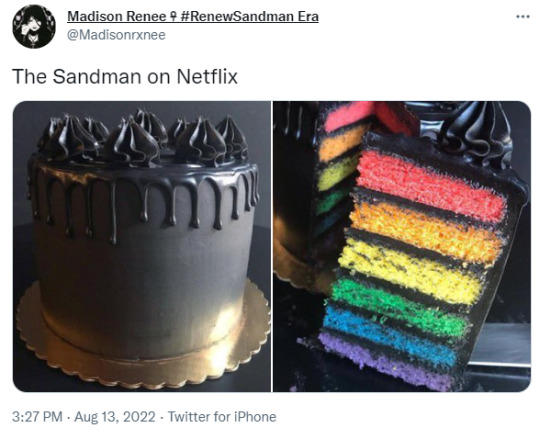
It's hard to express how transformative The Sandman can feel for queer people. It's not that it's the only queer literature around; queer literature abounds. It's not that it was the first of its kind; queer literature has been around forever. It's that The Sandman gets a lot of things right that many attempts at queer stories don't.
-----
First, The Sandman's queer characters are simply allowed to exist without the entire story revolving around their queerness. Their story doesn't have to center on a coming out journey or parental rejection, which seems to be all that Hollywood is capable of writing. While this kind of work can be important, it still paints us as "other" and "abnormal". We are anything but an accepted facet of reality.
Meanwhile, the world of The Sandman is a world where queer people are an accepted and normal part of it. As such, their stories can be more complex than the tropes we are normally fed.

Second, by virtue of queer normalization, the world of The Sandman lacks the constant vigilance that queer people have to deal with in reality. In our world, you always have to wonder if someone is going to accept or reject you once they find out, and be careful about who you talk to or what you talk about. Depending on where you live, you might have to worry about getting hatecrimed, attacked, or even killed for your queerness. This creates a constant vigilance of monitoring your surroundings, and policing your own language and behavior to keep yourself safe.
However, in a world where queerness is normalized, all of that labor disappears. You can simply exist without the added strain (at least in regards to queerness). Reading or watching The Sandman is freeing in a way that existing in reality is not.
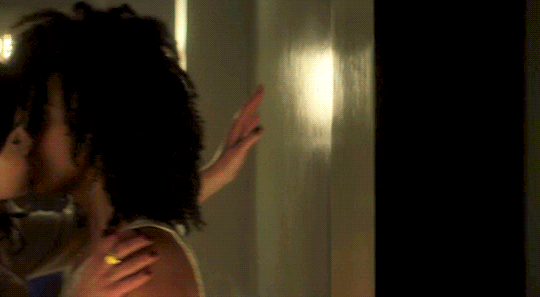
Third, certain problematic stereotypes in media dissolve. In most media, queerness is deeply linked with villainy. Antagonists are purposefully queer-coded (read: made to look or act queer on purpose), while heroes are usually anything but. This creates a link between "evil" and "queerness" in the consumer's mind.
Besides being problematic on its own, this presents a problem for writers who want to write non-problematic stories about queer people. It means that you can't actually have a villain in your story that is queer without an audience assuming that their queerness and villainy are tied, i.e. that the villain is evil because they are queer. Sandman subverts this.
Consider the Corinthian: he's evil and he's queer. But because he exists in a world where queerness is everywhere and normalized, we know that he's not evil because he's queer; he's evil and happens to also be queer. Not having him be the only queer character in the story unlinks his villainy and queerness.
Further, even if we narrow our view to only the Corinthian, we have examples of his queerness existing without his villainy: he sleeps with Carl without killing him. This single act immediately unlinks his murderousness and his queer identity, allowing us to see them as separate facets. And in so doing, The Sandman manages to fully subvert the queer-coded villain trope that otherwise ends up being harmful and everywhere in media.

Fourth, queer characters finally get to be sexy. Did you laugh at that sentence? It's okay. But this is a real thing that happens in media: queer characters are often so stereotyped or infantilized that seeing normal, queer folk that are attractive is a freeing experience in and of itself.
Nonbinary folk in particular are usually infantilized. Yet The Sandman gives us Desire, a nonbinary person and the literal embodiment of hotness who creates thirst outside of the bounds of gendered constructs (or, perhaps, within all of them). Desire is anything but infantilized. And in giving them to us, The Sandman manages to turn this trope on its head in a single, swift (and sensuous ;)…) movement.
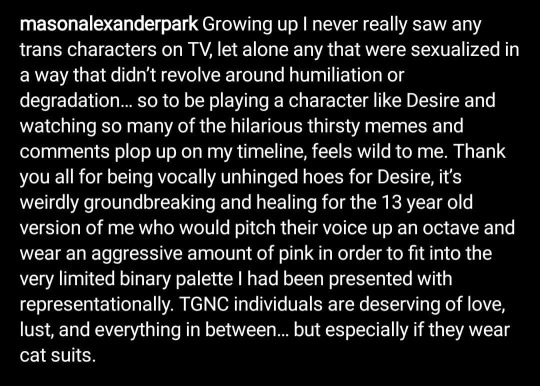
The final point has less to do with the story and more to do with the context of publication. When queer folk write queer stories, those stories tend to circulate largely only within the queer community. This does very little to allow engagement from the people we need engagement from most, i.e. non-queer folk who could benefit from unlearning stereotypes.
But when a story gets published by a major label, it allows that story to be seen by a much wider audience. The Sandman opens up queer media to a wider audience by virtue of being written for a major comic label and then later transformed into a popular TV series. It does much more to undo the harm caused by stereotyped pieces of media when a transformative work reaches a wider audience. Yes, it's unfair that people outside of the queer community often won't engage directly with queer media. But that's the reality we live in, so works like The Sandman become hugely important.
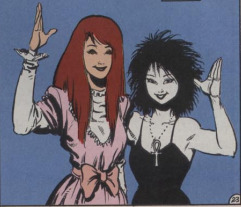
So when you see the queer community delighting at The Sandman, it's not an exaggeration. It's an expression of unmitigated joy.
545 notes
·
View notes
Text
Fantasy Book Review: A Taste of Gold and Iron by Alexandra Rowland
JJ's rating: 5/5
How feral did it make me: 5/5
My book reviews
I’ve been reading (or listening) to a lot more books this year than normal, and I have realized that I need an outlet to talk about them. I considered making a goodreads account, but hey I already have this! So I will be reviewing the books I’ve read this year, and depending on how long it takes me, I might just start reviewing all my favorite reads. I'm probably going to add links to my blog to make them easier to find.
Let’s get into it. This book is so good. SO GOOD. I listened to it on audiobook, which normally means while I’m at work, driving, or at home doing chores, but I literally listened to the last 2 hours of this book at home doing absolutely nothing, just on the edge of my damn seat!
Here’s a quick summary: the very anxious Prince Kadou accidentally causes a serious incident that leaves multiple of his personal guards dead or injured. In the aftermath, he is assigned a new guard by the sultan who is known for being an uptight rule follower. As their personalities clash, they have to solve a mystery and learn to work together…
I want to preface this review by saying that this is definitely a romance novel with a fantasy setting. The world building, especially for the main country this novel takes place in, is great and extremely vivid without unnecessary info dumps. The main plot of the story is perfectly serviceable, if a tad predictable, but it 1000% does what it needs to do for the romance.
But, the romance. THE ROMANCE. This book was advertised as an “enemies to lovers slow burn romance” and it 100% delivers on both. Now, when some people think “enemies to lovers” or (even better imo) “enemies to friends to lovers”, they imagine that at least one of the parties involved is a horrible villain and the relationship is probably abusive in some way. I’m sure there are plenty of books out there where that is absolutely the case, but Rowland gets what makes that trope so good. It’s about two characters who are both good people, but initially clash. It’s the mutual hatred born out of a fundamental misunderstanding of the other’s character, it’s the eventual begrudging respect, it’s THE YEARNING. THE PINING.
Both of these characters are so wonderful. We get both POV’s throughout: Kadou’s anxious desire to do what’s best for his country and not fuck anything up, and Evemere’s steadfast, noble determination to understand what makes the prince the way he is.
I don’t want to give too much more away, but this book is filled with ALL the delightful romance tropes you could ever desire.
Can we talk about pacing?? Pacing is so, so important, especially when writing a slow burn romance, and this author GETS. IT. Sometimes if the romance is resolved too early, all the tension goes out of the story, because if it’s a romance novel, we’re here for the romance, not the plot. But in this story the whole novel is centered around the romance, and the pacing just works so, so well.
Also, the way that queerness is written into this story is wonderful. Third gender pronouns abound and same sex attraction is fully accepted, and it’s really refreshing. Also, there are multiple female characters who play significant roles in the story who are fleshed out characters, which I feel is sometimes lacking in M/M romances.
I have not been able to stop thinking about this book since I finished it like four days ago. I listened to the audio book, which had an excellent narrator, but have also ordered the paperback with my favorite version of the cover. Please, do yourself the favor and read this one. Also, if you do read it, the author published a 10,000 word fanfic epilogue on AO3. It’s called What spring does with the cherry trees, and it’s a goddamn delight.
54 notes
·
View notes
Photo
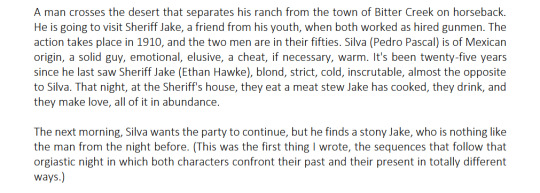
A man crosses the desert that separates his ranch from the town of Bitter Creek on horseback. He is going to visit Sheriff Jake, a friend from his youth, when both worked as hired gunmen. The action takes place in 1910, and the two men are in their fifties. Silva (Pedro Pascal) is of Mexican origin, a solid guy, emotional, elusive, a cheat, if necessary, warm. It's been twenty-five years since he last saw Sheriff Jake (Ethan Hawke), blond, strict, cold, inscrutable, almost the opposite to Silva. That night, at the Sheriff's house, they eat a meat stew Jake has cooked, they drink, and they make love, all of it in abundance.
The next morning, Silva wants the party to continue, but he finds a stony Jake, who is nothing like the man from the night before. (This was the first thing I wrote, the sequences that follow that orgiastic night in which both characters confront their past and their present in totally different ways.)
spoilers ahead!
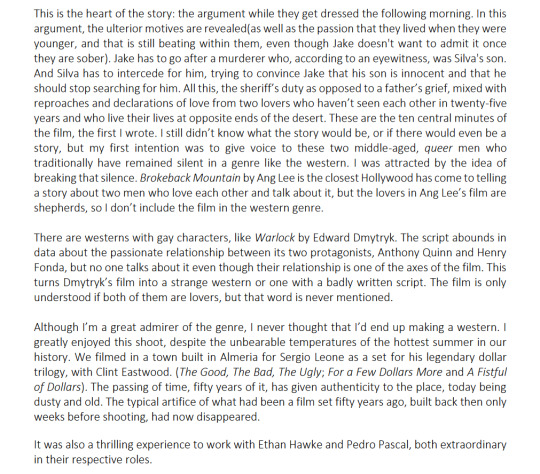
This is the heart of the story: the argument while they get dressed the following morning. In this argument, the ulterior motives are revealed(as well as the passion that they lived when they were younger, and that is still beating within them, even though Jake doesn't want to admit it once they are sober). Jake has to go after a murderer who, according to an eyewitness, was Silva's son. And Silva has to intercede for him, trying to convince Jake that his son is innocent and that he should stop searching for him. All this, the sheriff’s duty as opposed to a father’s grief, mixed with reproaches and declarations of love from two lovers who haven’t seen each other in twenty-five years and who live their lives at opposite ends of the desert. These are the ten central minutes of the film, the first I wrote. I still didn’t know what the story would be, or if there would even be a story, but my first intention was to give voice to these two middle-aged, queer men who traditionally have remained silent in a genre like the western. I was attracted by the idea of breaking that silence. Brokeback Mountain by Ang Lee is the closest Hollywood has come to telling a story about two men who love each other and talk about it, but the lovers in Ang Lee’s film are shepherds, so I don’t include the film in the western genre.
There are westerns with gay characters, like Warlock by Edward Dmytryk. The script abounds in data about the passionate relationship between its two protagonists, Anthony Quinn and Henry Fonda, but no one talks about it even though their relationship is one of the axes of the film. This turns Dmytryk’s film into a strange western or one with a badly written script. The film is only understood if both of them are lovers, but that word is never mentioned.
Although I’m a great admirer of the genre, I never thought that I’d end up making a western. I greatly enjoyed this shoot, despite the unbearable temperatures of the hottest summer in our history. We filmed in a town built in Almeria for Sergio Leone as a set for his legendary dollar trilogy, with Clint Eastwood. (The Good, The Bad, The Ugly; For a Few Dollars More and A Fistful of Dollars). The passing of time, fifty years of it, has given authenticity to the place, today being dusty and old. The typical artifice of what had been a film set fifty years ago, built back then only weeks before shooting, had now disappeared.
It was also a thrilling experience to work with Ethan Hawke and Pedro Pascal, both extraordinary in their respective roles.

As for the décor, I have respected the rules of the genre without falling into any anachronistic temptation, except for the song at the beginning, with the voice of Caetano Veloso and the angelical face of Manu Ríos, which gives the film its title.
For the choice of paintings on the walls of the two most important sets, the interior of the sheriff’s house and the ranch where Silva lives, I have turned to artists of the time. In Sheriff Jake’s house there are several paintings by Maynard Dixon, one of the first artists, if not the first, to paint landscapes from the American West, with native Indians and cowboys. For me it has all been a discovery, his work possesses a coloring untypical of the time that brings it close to pop and at times to impressionism. There is also a portrait of the artist Lily Langtry, very famous at the start of the century, who actually made a silent film and whom Ava Gardner plays in The Life and Times of Judge Roy Bean along with Paul Newman. The other great artist who appears on the walls of the ranch is Georgia O’Keefe, the Mexican landscape that hangs over Silva’s bed.
Saint Laurent by Anthony Vaccarello was in charge of the entire wardrobe. We took our inspiration not so much from the reality of the time but from cinema, how actors were dressed in westerns between 1900 and 1915. If anyone wonders about Pedro Pascal wearing a green jacket, I recommend watching Bend of the River by Anthony Mann, where James Stewart wears an identical green jacket. And I have a lot of respect for Anthony Mann and James Stewart.
We are also inspired by Veracruz (Robert Aldrich), specifically for the outfit worn by Silva's murderous son Joe. It is inspired by Burt Lancaster, all black.
And Sheriff Jake, he's in a suit, with a vest and bola tie, like almost all the sheriffs in the Westerns I have watched. Kirk Douglas is one of the models, whether playing a sheriff or a card player, Gun Fight at the OK Corral or in Last Train from Gun Hill, both by John Sturges. I have re-watched many westerns so as not to fall into anachronisms and the truth is that the male wardrobe has changed very little, the sheriff is always the most elegant, usually with a suit, waistcoat (the fabric of the waistcoat was the only thing that allowed you some fantasy, with shiny damasks), shirt and around the neck a bola tie.
The rest of the male characters always wear a scarf around their necks, in different colours and patterns, a checked shirt and a waistcoat. The dresses of the Mexican prostitutes are inspired by El Dorado (Howard Hawks). I have done my research with a multitude of westerns, especially Hawks, John Ford, John Sturges, Raoul Walsh, Anthony Mann, Peckinpah, Robert Aldrich, etc.
As for the narrative in general and the music, I have followed the classical canon. Despite the fact that in Spain we have a great tradition of spaghetti westerns, more than a hundred were filmed in the 60s and 70s. I have not been inspired by any of them and the composer Alberto Iglesias has avoided Ennio Morricone, who would have been the easiest reference.
Pedro Almodóvar
118 notes
·
View notes
Text
My Argument for Homosexual but Panromantic Art and Aromantic but (Something)sexual Tashi
@seek--rest I AM SO SORRY BECAUSE THIS IS A BOOK. That's why I didn't put it in your asks, so I could put it under a cut.
Okay, so I think it should be acknowledged before I get into my thinky thoughts that art is up to interpretation and I am not really trying to convince anyone of my perspective. There's a certain amount of bias that anyone comes into any experience with and it's going to color their perception no matter what. And that bias could be anything.
It could be the experience of having been cheated on and really loathing any kind of infidelity, emotional, sexual or otherwise. It could be being queer and therefore more fluent in queer subtext (though, of course, this movie was pretty blatant -- bananas and churros and boners abound lol) or being a black woman and sympathizing with Tashi's experience (which I am and do), or having been homeless/hungry and sympathizing with Patrick or any number of other life experiences that lends us to partiality toward one character or another, or more aversion to/disidentification with one or another character's plight.
So, I just wanted to start with that universal acknowledgement first. And then also say that I love each of these characters in their own ways and so when I say something that could be perceived as negative, like Art is petty or Tashi is cold, or Patrick is trash, I mean it in the most loving of ways. lol Because I enjoy seeing complex characters come to life. I don't need them to be right all the time, or for their motivations to be simple. I prefer the more complicated motivations and relationships, tbh, which also plays a part, I think, in how I see them. My take on these characters is the least kind. I see them all as their worst selves lol
So my point is that some of this is just down to what we think. And we won't ever be on the same page, because we're different people. With all that said...this is why Art's feelings for Tashi are ambiguous to me and why I think Tashi could be read as aromantic (not just not in love with Art, but not in love with Patrick either. Not in love with anyone, just in love with tennis.)
It's been clearly stated by the director himself that the movie is queer, which is, in large part, a reference to Art and Patrick's non-platonic relationship to one another. Poly relationships could be argued to be inherently queer, even if the relationships are all hetero-romantic, but I don't think that's how it was being used. Everyone, down to the actors themselves and the people who made the soundtrack are aware of the movie being about "Unending Homoerotic Desire". That's gay. lol It's not JUST gay, but it is gay.
And to me, this desire is seen to be mutual from pretty early in the film, both by how they look at each other and interact with each other and through Tashi's recognition of their intimacy. i.e. working deliberately to get them kissing (not holding hands, not hugging, kissing, something romantic/sexual) -- Tashi, to whom tennis is a relationship. Who noted that they are Fire&Ice and was drawn to them (Both of them together, not separately!) enough to come into their space and fuck around. lol
We learn quickly that they've shared bunks since they were around 12 years old, that Patrick was essentially Art's first sexual experience, that they're incredibly tactile, attached at the hip, and that they move in unison.
My read of Tashi here is that she's young and having fun, and she has her whole life of tennis stardom ahead of her. And she's an enigma to them. I would argue that much of both their attraction to Tashi has much to do with her dominance on the court, her ferocity, her skill, and her take no bullshit attitude. I think it has as little to do with her gender and her physical makeup as it has to do with her race or whether she's left-handed. Tashi OWNS the Tennis court and that's hot.
But if we're going to talk just about physical attraction and sexual desire, I'd argue Patrick's desire is put front and center. Art's is....more questionable. Patrick is the one who shows Tashi to Art. He's the one who has been following her game, knows who she is. Has watched her play. It's established right away that Patrick finds her "hot". Art asks why he's into her "Is it her game?" (his first thought is her skill, not whether she's pretty), and Patrick clarifies, no, she's the hottest woman he's ever seen.
Small, yes. And something I can see a lot of people disregarding, but since it's already been established this is a queer film, and we have little dialogue to go off of, I think it's significant that Art's frame of reference, or the way he relates to women is immediately presented as non-sexual. For a horny 18-year old this is notable.
Then we have Art say, "Look at that Backhand" in a dreamy voice. Not, look at those legs, or look at that ass. Patrick grabs his leg in excitement, eyes only on Tashi. And then we have two boners. lol Okay, yes, Tashi is without a doubt a part of this, but the camera didn't show that touch for no reason. Patrick is not outside of the bubble of desire for Art, even here. He's adding to it. And later we get something along the lines of Art saying, "that scream". Okay, so Art's drawn in by her, yes. He seems to be mesmerized and in awe of her power and skill, how wild she is on the court.
Later at the party, again, Patrick is the one to articulate sexual feelings tied to whatever makes him mesmerized about Tashi Duncan, "I'd let her fuck me with a racket," visceral, physical, sexual, tangible.
They both watch her on the dance floor, again, there IS desire, but that desire for Art is not articulated, and STILL Patrick is present, being very vocal about his. So, for me, it's all tied together -- there is no separating Art's desire for Tashi from Patrick's desire. We only see it with Patrick present. (Throughout the whole film! Because scenes with just Tashi and Art, throughout the entire film, are without the evident heat, fire, and urgency that is very much present with Patrick and Tashi. I'll get to Art's ahem performance issues in a bit, but yeah )
Then the introduction, Okay. There's this kinda immediate back-and-forth with Patrick and Tashi. And Art's quieter, almost left out of the conversation until he inserts himself. Then she leaves them dizzy in her wake. And Art says they should go. Some might say, "oh poor doggo just didn't think he'd have a chance." Maybe! Or maybe he really was just going to leave without shooting his shot because he wasn't running this show, flirting with her wasn't driven by his desire. It was driven by Patrick's. It was enough for him to meet the future Queen of Tennis, may she forever reign. And they could go back to the room and jerk off in separate beds thinking about her, just like they had that other girl.
He said, "okay let's go". and Patrick just sat there, and Art smiled knowingly, seeing he very clearly was not getting up to walk away. It was Patrick who pushed this. And then again, in the room, Patrick who was STILL talking about her. And Art said, offhandedly, not sounding miserable or even all that hurt, just kind of knowing and teasing, "she's not coming man." Patrick is obsessed, the way you are when you're really into someone. Art is...neutral. Did he find her magnetic? Hell yes. But does he see her as a person who he wants to pursue and further connect to? Not sure.
Okay, and then we have the lovely scene where Tashi asks if they've ever.....and Art get all flustered and No No NO, and Patrick is the one to let slip. And we're also given this lil tidbit that Patrick has dated girls, is apparently somewhat of a player, and Art is...what? Said to be dating no one, possibly having dated no one? Patrick jokes "of course he cleans up with that face", but it's pretty much implied that Art hasn't dated. Again, small things. But now they're starting to add up for me.
Between Patrick being his first sexual experience, Art apparently not being all that into girls in general, and the already established intimacy that they share, I'm thinking hmmm, maybe Art is in the closet. First thought, right out the gate. But maybe not enough for some people. Cool.
Then we get the game. And one could argue Art wanted to win to date Tashi. OR one could argue Art wanted to win so that Patrick wouldn't date Tashi. Hold my beer. lol
Lbr, do you know any 20-year old lad that, had they lost a bet or a game, and promised they wouldn't try and talk to some girl because they'd lost, wouldn't try to slide into the DMs anyway? Like, be for real. Art is quieter than Patrick, but he's smart, talented, cute, he is the one who makes calls during their double's games. He isn't some delicate flower who can't have a conversation. He can hold his own when he wants to.
He does just fine telling Tashi he wants to kiss her when he's good and ready, so if he wanted her, why not go after her? Or at the very least, why not attend her games at Stanford? Why not ask her out to lunch? Why not get close to her under the guise of exchanging messages for Patrick? Folks seem to want to paint him as a saint. He's a teenaged boy. No one takes dating all that seriously at that age, especially not in college, when everyone is hooking up. I'm not saying he isn't loyal to Patrick, but the occasional conversation? Or just being friends to be in her space, since he had so many feelings? Nothing?
And then the FIRST time in a year -- a year of Tashi and Patrick dating -- Art sits down with Tashi and he doesn't talk about her game. He doesn't talk about how beautiful she looks. He doesn't talk about how much he's missed her or what he'd love to do with her (or have her do to him), he talks about.....Patrick. lol wtf.
When Tashi asks him if he's in love with her, what does he say? He doesn't say yes. He doesn't even jokingly say yes, in a flirty, teasing way. He says "who wouldn't be." Think about how carefully that sidesteps her question. Not "of course I am". "Who wouldn't be?" That is not a yes, fam. That's a general, anyone would be in love with you because you're Tashi Fucking Duncan. Thanks, she knows, that's not what she asked. She asked if You love her, and we know how perceptive Tashi is, how astute.
She knows what she's not hearing. That's why she asks again 3 years later, slyly, "you still in love with me, Art?" knowing damn well that man never said he was. (This isn't just about what's being said, this is tone, body language. We speak with more than our words, you know? Anyway...)
So, Patrick comes in to visit. And Art is visibly happy to see him. And then Patrick says it's for Tashi, "Why do you think I'm here?" and look at Art's face. The man is NOT happy. Why? Because Patrick wants to see his girlfriend of a year? Who he talks to weekly? (Who Art already knows he talks to, because they've been dating?) Maybe. Or maybe because Art and Patrick have literally lived in one another's back pockets for 7 years and they've been separated, and the one time in however long Patrick comes back to visit and it's for Tashi. Might that bother him? No?
Okay. Then the fight, then the accident. And now suddenly Art doesn't talk to Patrick for YEARS. YEARS??? Someone explain this to me. Your here-to-fore best friend's girlfriend gets hurt, (and yes that's what I'm arguing Tashi was to him at this point, because aside from one awkward lunch that's all we have of their interaction) and you see it. And she's understandably mad, because she has to blame someone. And you're....Also mad??? Why, again?
Because she's the love of your life? Hmmm, reaching imo, Art barely knew her. They hadn't spent any TIME together. And this is where the realist in me comes out. Very romantic to imagine one night on the beach (with Patrick present) and a snog in a dank hotel room (again with Patrick present) made him fall in love with this woman, but I'm not buying it.
No, his longest lasting and most intimate relationship to that point is Patrick. And that's why the silent treatment is so peculiar. Even Patrick doesn't understand why Art stopped talking to him, and it's not because he's an oblivious dick. Patrick knows Art. He knows Art's patterns, his habits. And he knows Art's years-long freeze out just did not make sense, especially since Tashi had likely stopped blaming him years ago. I mean, Tashi clearly didn't blame Patrick for her injury when she and Art met up 3 years after college. So, if Tashi's not mad anymore (at him, specifically. she's mad in general at the world -- she's bitter and angry and in lots of pain. but she's not holding a grudge at him.), if she wants to move on, why are YOU still mad Art?
Make it make sense.
I argue Art was mad at Patrick for all of it. For leaving him at Stanford, for choosing Tashi, for taking their friendship for granted, for not prioritizing him. And then, somehow, for Tashi's injury too, because Patrick had the nerve to choose her and then be so insecure he couldn't go one day without fucking it up. And then Tashi got hurt and that somehow made it Art's fault (in his mind) and he resented that too. I think Art's resentment and anger was real and intense and I think even he didn't completely understand that this level of betrayal wasn't appropriate for a friend. But that's my take. lol
Anyway, then we get into Tashi and Art. And we see that it's been 3 years since college when they meet up again. So, Tashi had time to fully understand that the career she thought she'd have is never going to happen. And Art says she should be his coach. And she's a better coach than anyone could be, and Art, Art is good at flattery, and he's good at saying the right things and showing her that he'll basically be the anti-Patrick. He will listen to her, he will do as she says, he won't try to take anything she doesn't want to give, and he'll let her lead, he'll let her take him to his wins.
And Tashi, god Tashi needs that. Not a dick inside her. Not a tongue in her mouth. A body. A healthy, working body to mold and shape and make a winner. That's what she needs.
And so let's come back to the opening scenes. I saw someone say it was so crazy to see Art go from getting dragged out of bed to a physical therapist who stretches him out, to a nutritionist who feeds him and gives him his meals, to Tashi who instructs him and trains him. The man doesn't own his own body. He barely has autonomy. He's given it all over.
And if they love each other so much, they should happy with their arrangement right? But look at them. They sit on couches and benches five feet apart. They don't talk about anything but tennis. There's two scenes in the script (only one in the movie) where Art can't get it up for sex and Tashi is trying to coach him into an erection. Literally coach him through sex.
Not like...he has E.D. or he's depressed; then she wouldn't be trying to Jedi-mind trick him into getting hard. In the scene as written, she says something like "come on, you can get there. We always do" Always. As in every time they are trying for sexual intimacy -- which Tashi clearly wants, or she wouldn't be trying to get him there -- this is what they're doing. Working to get him hard enough. Yikes.
At their age, this is pretty confusing. So, this goes into my pile labeled, "things that make me think Art is not sexually attracted to women".
And then we have Art saying "I love you" and Tashi saying "I know." Art saying "I just need to know you'll still love me" and Tashi refusing to give that to him. Art having to beg for affection "just hold me?" and Tashi literally looking dead in the eyes as she acquiesces. This is not a couple that is happily married, if they ever were.
I think they've always had these issues, this mismatch in their needs. But Tashi needs to win so bad and Art needs so badly to give that to her, and to be something other than what he fears he is (nothing, no one). That, I think, is his biggest fear. That Patrick leaves him -- as he did -- and he's got no identity, no function. (This is where that part about co-dependcy the director talks about comes in. The codependency is not just between Tashi and Art). He needs to be able to be something without him. So he sets out to prove that and in the process what he becomes is hollow -- a machine. A body to be used for Tashi's win (HOT! okay, moving on lol).
I do feel there is love between them. You don't maintain a relationship, even a very broken one, for 13 years without loving the person in some way, somehow. I believe that Art has a lot of respect, admiration and affection for Tashi. I believe he loves her, truly. He might even be in love with her, but, from what I'm seeing in the "text" as you say (lol fancy term), I don't think he wants her. I don't think he's sexually attracted to her. Does he need that in a relationship? Maybe not, but he certainly needs a level of physical affection that Tashi does not seem very wiling to give him. Not if he has to beg for it.
Meanwhile, Patrick says Tashi hates Art, a little. And I think he's right. I don't think she wants to hate him, but Art is healthy. More than that he's recovered from an injury and she didn't! And even though he's well enough and good enough to win it all, he'll never want it like she wants it. He'll never eat, sleep, breathe, fuck, die for tennis. He wants to be good, he wants to play well, and he does. But that hunger? That drive that Tashi had (that Patrick also has) to be the best, to dominate on the court, that crazy, insane love with the game of tennis? That's not Art. Art is tired. And he wants to retire. And that makes Tashi hate him a bit.
Now, I don't think he's just a "dick and a racket" to her, but I do think it's interesting that she said it that way. We can't take dialogue just at face value. Dialogue is always doing more than one thing, especially in film, where screenplays are just dialogue and sparse action. She says it, not Patrick. And she's defensive about it.
This is another little clue on the pile of "signs Tashi loves Art but is probably incapable of being IN love with him". lol He isn't just a dick and a racket. He's the father of her kid (maybe! o__o), and the man who gives her what she needs to survive (the wins). But that's...pretty close to being a dick and a racket. lol And well, being a racket is a pretty big deal for Tashi.
Now their engagement didn't seem to be a particularly joyous affair. Tashi was drinking a scotch pretty moodily with that ring on her finger. You say you can't see her marrying without loving him romantically. And that's, again, a very sweet sentiment. But people get married for all kinds of reasons.
Art was already hers in the most important of ways. He'd given her his body. If he wanted her to marry him, why wouldn't she give him that? Who else was she going to marry? She'd gotten into bed with him (figuratively) for his entire career. Her life is getting him to win the grand slam. Her ultimate romance is winning that.
Tennis is her love affair. Why wouldn't she marry the only person who could possibly get her as close to her dream as she would ever get? They get the tax breaks, he binds himself to her even tighter. What's the downside?
And as far as the kid, I have theories (look at her hair!), but suffice it to say even If that's Art's kid, people choose to have/keep kids for all kinds of reasons, no? And it's not always "I love this person, I want to make a baby". Again, very sweet, but sometimes people decide to keep kids cause they hope that shared purpose brings them closer together. And I can see Art wanting the child and Tashi agreeing very practically, because why not? It's what families do, right? They could afford it -- they had present parents, and their kid would be the best tennis player this world has ever seen.
For all her passion and fire with Patrick, for all the sex and good feeling there, she doesn't seem to be particularly enamored of him. He's arguably, the person whose gotten the most from her, the biggest rise out of her, seen her underbelly, and he's the only other person in life she's gotten into bed with repeatedly (presumably). But she's not overly concerned with keeping him for herself. Or getting anything else from him. Monogamy. A confession of love. Affection. She even says it herself,
"Did I say I wanted anyone to be in love with me?"
Maybe she doesn't because she can't give that back.
Sex is shown to be something she wants and participates in with gusto. Romance? Mmmm. Not so much.
The most romantic thing she's ever said has been about tennis. Falling in love across the net. THAT is her romance. It's why she was drawn to Art and Patrick in the first place, Fire&Ice. She saw their intimacy and wanted to see it play out in another way. But ultimately she didn't even stay to watch them fuck -- she just wanted to see some good fucking tennis. And the most alive she looks in her adult life is after their match.
To me, you can see she's unhappy -- that she only feels satisfied when Art plays good fucking tennis, but Art only plays that way with Patrick, and Art was determined to freeze him out, so they were both miserable. Art without romantic love and affection, Tashi in a sexless, unsatisfying marriage. It takes Patrick coming back in to give them both what they need. They don't work without him, love him or hate him.
So yeah....that's my take on Art and Tashi. I think there is so much there, comfort and partnership and mutual need, but.....the romance people are seeing I'm just....I'm not seeing it.
And I didn’t really get to Patrick/Tashi, but THIS is part of it too.🤣
#challengers#challengers 2024#art x tashi#tashiart#tashi feeling alive when she sees some good fucking tennis#tashi seeing art and patrick and knowing immediately based on their doubles game that the relationship they share is magical#art donaldson#tashi duncan#ot3#if tashi and patrick could actually communicate#and if art and tashi figure out their shit furreal#musings
15 notes
·
View notes
Text
Shoscombe Old Place full
First of all, in my head this story is either called Shoscombe Old Spot*, and is about pigs, or Is a repeat of the Boscombe Valley Mystery. I cannot call it the right name to save my life.
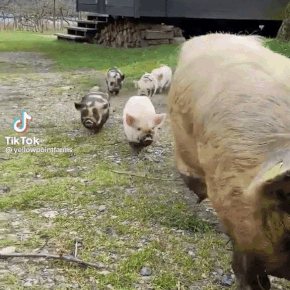
This is all I am going to see for every character in this story. I apologise in advance.
*There is a type of pig called a Gloucester Old Spot.
Sherlock Holmes had been bending for a long time over a low-power microscope. Now he straightened himself up and looked round at me in triumph.
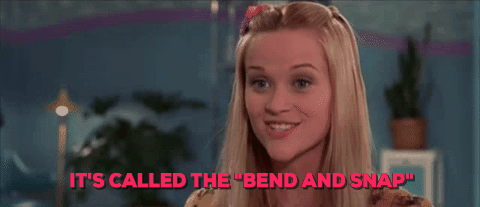
"Since I ran down that coiner by the zinc and copper filings in the seam of his cuff they have begun to realize the importance of the microscope.”
And 100 years later it would be used in flashy, edited montages of pretty forensic scientists also identifying glue and threads from a tweed coat.
"Watson, you know something of racing?”
“I ought to. I pay for it with about half my wound pension.”
Did Mary die, or did she throw him out for his gambling addiction and they both agreed to pretend the other was dead because it's Victorian Britain?
“It was when he horsewhipped Sam Brewer, the well-known Curzon Street money-lender, on Newmarket Heath. He nearly killed the man.”
“Ah, he sounds interesting! Does he often indulge in that way?”
I would call that neither interesting, nor indulging, but you do you, I guess.

Sir Robert Norberton. Sounds like a great guy.
"He should have been a buck in the days of the Regency—a boxer, an athlete, a plunger on the turf, a lover of fair ladies, and, by all account, so far down Queer Street that he may never find his way back again.”
That took a distinct turn for the unexpected at the end there. Quite the euphemism there. Apparently it just means he has money problems (presumably because of being a horrible person and a gambler) but the joys of linguistic evolution strike again.
Is he... far down Queer Street, or has he just gone a few steps?
“There are the Shoscombe spaniels,” said I. “You hear of them at every dog show. The most exclusive breed in England. They are the special pride of the lady of Shoscombe Old Place.”
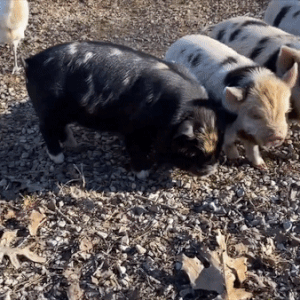
The spaniels are now also pigs in my brain. Everything is pigs. It's actually a long con that Lady Beatrice has been pulling for years. 'Most exclusive breed' = they're actually pigs in disguise.
...the firm, austere expression which is only seen upon those who have to control horses or boys.
This absolutely made me laugh. Excellent description.
“First of all, Mr. Holmes, I think that my employer, Sir Robert, has gone mad.”
Really? How could you tell? He seems like such a level-headed and calm person with absolutely no emotional issues whatsoever.
No really, how could you tell?
“Well, sir, when a man does one queer thing, or two queer things, there may be a meaning to it, but when everything he does is queer, then you begin to wonder."
😐😐😐
They did say he was pretty far down Queer Street, my dude. That's probably what the issue is.
This story is already one of the most unintentionally hilarious we've read. I hope it doesn't end with the deaths of horses or children. Or some woman marrying the abusive arsehole. That would ruin the joy.
And ah, we have reached the casual antisemitism. Because of course we have. Money lenders were mentioned, clearly there was going to be some.
"Then there is his conduct to Lady Beatrice!”
“Ah! What is that?”
“They have always been the best of friends. They had the same tastes, the two of them"
Does she also enjoy whipping people almost to death? Family dinners must be a riot!
“And a bitter, savage, spiteful quarrel at that. Why else would he give away her pet spaniel that she loved as if he were her child?"

"But then, again, what is master doing down at the old church crypt at night? And who is the man that meets him there?”
...I mean... Do we really want to get into that?
There's a haunted crypt? Excellent. Ghost pigs abound.
"So we up when Sir Robert was gone and pretended we were just having a walk like in the moonlight..."
Just a casual moonlit bro walk at midnight in the hook-up graveyard. Like bros.
What even is this story? I don't need to provide commentary, it's all in the text (apart from the pigs).
‘Hullo, mate! who may you be?’ says I. I guess he had not heard us coming, so he looked over his shoulder with a face as if he had seen the devil coming out of hell.
You were in the haunted graveyard. He thought you were a fucking ghost my friend. And if he didn't, he should have done and I will be very annoyed.
"From Dr. Watson's description of Sir Robert I can realize that no woman is safe from him."
Or man. Or non-binary person.
“No, sir, and there is something more that I can't fit in. Why should Sir Robert want to dig up a dead body?”
I feel... like you could have opened with the grave robbery? Maybe. Could be important. Seems relevant, if not to the case as a whole then just to... general interest, honestly.
If he dug up a grave at the haunted hook-up graveyard on Queer Street, man's going to be haunted by all the queerest ghosts. It's going to be Queer Eye for a Live Guy all over that place. Though I suspect Sr Robert is beyond their undead assistance.
"It was all in order, sir, except that in one corner was a bit of a human body.”
A bit... Which bit?
"It was just the head and a few bones of a mummy. It may have been a thousand years old."
Oh wow, is this the thing where people ate mummies for their health or something? There was a massive fad where people were just like 'I guess eating this person who is dead will stop me from dying, that makes logical sense and isn't disgusting at all' nom nom nom. Please tell me one of these people is a cannibal. Not like cannibalism yay, obviously, but that's pretty much the last thing this story needs to become completely epic.
"The creature was howling outside the old well-house, and Sir Robert was in one of his tantrums that morning. He caught it up, and I thought he would have killed it. Then he gave it to Sandy Bain, the jockey, and told him to take the dog to old Barnes at the Green Dragon, for he never wished to see it again.”
Ways in which Sir Robert Norberton is better than Sir Eustace of The Abbey Grange fame: instead of covering the dog in petrol and setting it on fire, Sir Robert just sent it away. The bar is so incredibly low for Holmesian villains.
Also, there was something in the old well-house. Probably a horse. Dog was giving it away so dog had to go.
But he didn't kill the dog. So proud. He can whip men half to death, but he draws the line at hurting dogs, apparently.
“It's the upper condyle of a human femur,” said I.
Hey. Look! Watson did a doctor thing! And it wasn't brandy.
And now they're going undercover.
Part 2
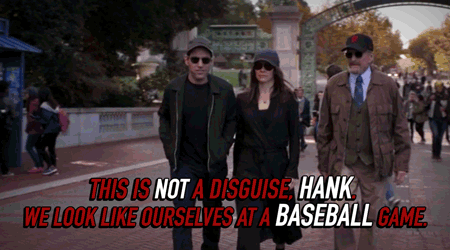
"...refuses to stop at the stables to greet her favourite horse..."
This makes me feel like it's not her favourite horse. We've already been told the horse has a doppelganger. Did the real horse die and now he's got a problem because all his money is on the horse winning the race, but he's only got the rubbish one? Or was there only ever one horse in the first place and it's rubbish? But the bone is a human femur, or so Watson says.
"Let us suppose, Watson—it is merely a scandalous supposition, a hypothesis put forward for argument's sake—that Sir Robert has done away with his sister.”
Did not see that coming. I think I missed that no one at all had seen her other than the maid. I guess it makes sense because if she dies, the estate goes to someone else and then he has no money at all. I have been distracted by horses.
Though the fact that Holmes is saying this implies to me that it's not the case. On the other hand, this is only a two parter, so there can't be that much more plot to go.
“My dear Holmes, it is out of the question.”
“Very possibly, Watson. Sir Robert is a man of an honourable stock."
There is so much wrong with this exchange, I don't know where to start.
"Never mind me. I shall stand behind this holly-bush and see what I can see.”
By which you mean whether the 'spaniel' wants to go to its mistress.
Aw, he's such a good boy.

Then they stop in the suspected murder investigation to have a fishing day. That's the thing about the Holmes stories. ACD isn't afraid to say 'and there was nothing that could be done right then so we just had a jolly day out'. Crime fighting is such a leisurely business.
“‘Fore God, Mr. Holmes, it's all right,” said he. “Appearances are against me, I'll admit, but I could act no otherwise.”
A surprisingly reasonable response here from the man that we have been repeatedly told by multiple people likes to punch first and ask questions never.
"Mrs. Norlett, under her maiden name of Evans, has for some years been my sister's confidential maid."
The maid is married!? and her husband's a character?! That Sir Robert knows?! Plot twist!
So she died of natural causes. That's kind of nice. If it wasn't for all the antisemitism, this one would be pretty good.
Except for how the violent gambling addict magically makes good in the end and turns out not to be so bad after all. Though I suppose I should be happy he turned his life around. Maybe a little anticlimactic, but it's a good twist that I didn't see coming because I was too busy thinking of horses.

And pigs.
26 notes
·
View notes
Text
MOONLIGHT CHICKEN – THE THEME SONG
youtube
I think everybody must already know this by now, but just in case – Moonlight Chicken is a series that leans heavily into the Thai-Chinese experience (cultural markers abound – chicken rice, the names like Wen and Li Ming, the joss sticks and offerings, mooncakes and the Mid-Autumn Festival, the temple with its red Chinese characters, so many others).
The reasons are multiple I think; ostensibly this is Director Aof's homage to his childhood in Pattaya (if I'm not mistaken that is, I think I read it somewhere on Reddit?) and if it was a Thai-Chinese childhood then yes it makes sense. But it also dovetails nicely with Thailand's efforts to market its cultural offerings (of which BL is one) to the giant East Asian market, while potentially attracting even more visitors for the important tourism sector.
Anyway, this partly explains why the theme song is sung NOT IN THAI but in Mandarin Chinese. And it's significant for a couple of reasons.
The first – the song is titled "The Moon Represents My Heart" (月亮代表我的心/yuè liang dài biǎo wǒ de xīn), and it is a perfect fit for all the lunar-themed references in this series (or maybe it was their start point? 🤔).
But there's more – the song (originally popularized by the late Teresa Teng in the 1970s) was given an LGBTQ+ twist by the late, great Leslie Cheung when he publicly came out and sang this love song to his partner in a 1997 concert:
Because of this, in some Chinese-majority areas (I'm thinking Taiwan and Hong Kong, not sure about Singapore) the song has now become an iconic queer love song. And this is why Mile and Apo also sang it during the Taipei leg of the KinnPorsche World Tour (Taiwan being the first state in Asia to legalize gay marriage).
It's not just any old song – it fits the themes of this show perfectly, and I'm hopeful that other aspects of Moonlight Chicken will also show that they came about from the same deliberate and deeply thoughtful approach to the creative process.
Can't wait for the next episode! 💖
121 notes
·
View notes
Note
Hello! A pre-emptive Storytelling Saturday for next week: Describe your WIP in bullet points so my ADHD brain gets it quickly! 🥺🥺🥺 I would love to hear more
(Let's just ignore the fact that it's Sunday.) Hey, sorry I've been sitting on this one for a little while!! I'm not sure if you mean bullet points as in an actual summary or tropes, features, etc. so I'll try to mix both in. I'll just do libaw & TDL since I feel like SUPERNOVA's still very much percolating and not necessarily concrete enough for this exercise. ^^
tl;dr: I primarily write extremely dark (realistic) crime fiction focused around complex and unsympathetic queer characters. Fair warning: dead doves and heavy themes abound.
LIFE IN BLACK AND WHITE 🌙❄️ | Adult psychological thriller
A man works to overcome an increasingly dark obsession with his estranged ex-lover after the catastrophic interruption of their twisted relationship, only for an unexpected event to bring the past back to haunt him - literally.
Themes: Importance of nuance, domestic abuse/violence, control, agency, choice, obsession, unrequited love, mental illness and recovery, stigma;
Unreliable (and often unsympathetic) narrator;
Protagonist is obsessed/"in love" with the antagonist;
Heavy use of symbolism;
Fast-paced;
Aughts period piece;
Very intimate, introspective narrative (first person present ftw);
Queer lit, but make it dark and gritty.
THE DOTTED LINE 💀🐍 | Adult psychological horror
Young inmate navigates the perilous terrain of a U.S. medium security prison while plotting his escape (+ various bonus antics that sound very made up);
Villain protagonist with some very... interesting opinions... who lives by his own convoluted rules and morality;
Side cast that the protagonist gives zero shits about but usually still manage to be compelling;
Extremely dramatic events described in the most deadpan tone imaginable;
Themes: Survival, reinvention of self, identity, agency/autonomy, nature vs. nurture, corruption, prison abolition/heavy critique of the correctional system.
Experimental psychological and body horror + plays with classic slasher tropes; heavy experiments with form/prose/structure.
Subverts the hero's journey structure.
Currently drafting very slowly and intermittently; the draft should be finished in approximately 84 business years.
9 notes
·
View notes
Text
i'm so annoyed about the recent episodes and the season in general
this isn't a coherent rant so yeah, i'm sorry. but what the fuck? the season started off so good how did they manage to fuck it all up?
anyway, being an adaptation of merlí aside, i'm so annoyed how these fuckers and rai act so proud of themselves for representing gay characters and queer stories on mainstream tv. okay, but have you actually stopped to look how you're portraying them?
let's set aside simuel at first because it's already expected they would fuck that up. But let's focus on Simone's character for a second.
What are his story threads in season 2?
Being lied to by his father to protect him (again)
Being outed by his father
Being hate crimed and not getting justice for it, he even got suspended
Simping for Mimmo
Simping-ish for Manuel
Supporting Mimmo in his crimes
You are proud of representing queer characters, gay characters. But representing them as what? As a person deserving of being outed? As a person deserving of being lied to, being hate crimed, being involved in crime? what kind of representation is that? if you just make a character gay without doing the bare minimum of researching and handling it with care, then it would have been better to make him straight.
Manuel actually has good storyline but the fact that in the press, they're denying and erasing his bisexuality is so appalling. you can handle representing a gay guy but when it's a bisexual person, it's too far? it's too fantastical?
other problems abound: Anita in season 2 is not the Anita from season 1. They're different people. Dante forcing Rayan to tell his traumatic experience to the class is wicked and it should not have happened. He should have respected Rayan's boundaries. Fuck your class. Luna's plot line??? It should have involved all the girls helping her, instead of the men being there and then patting themselves in the back for doing the bare minimum???
i'm sorry for being upset. but they had a chance to write a great season. one that could have been greater than merlí's frankly god-awful season 2. i know i shouldn't be bummed about a show not being what imagine it should have been, but this isn't that? it's writers literally disrespecting their huge fanbase? it's them, saying fuck you to the people they claim to represent.
they had two years to research, to write something even half-decent. this is unacceptable. there will definitely be a season 3 bc of the recent success in ratings. but what i don't know what shape and form that will take. i just hope that they do it at least for their actors because they have such a solid cast. they just keep getting given the most melodramatic, shallow and surface-level writing.
#un professore#dumbass#get new writers#stop being homophobic i hate it here#simuel#simone#manuel#get better writers#move un professore to netflix#merlí#tortellini
12 notes
·
View notes
Text
Bengiyo Queer Cinema Syllabus
Not to sound repetitive but, I had a busy couple weeks, but finally had a second to return to @bengiyo’s queer cinema syllabus. I am currently working my way through Unit 4: Heartbreak Alley, the totally light-hearted, definitely not agonizing section of the syllabus where I get to watch countless acts of violence be committed against queer people. Thank fuck I have Lesbians waiting for me at the end of this unit. The films in Unit 4 are: Bent (1997), Strange Fruit (2004), Boys Don’t Cry (1999), Brokeback Mountain (2005), Parting Glances (1986), Philadelphia (1993), The Living End (1992), Holding the Man (2015), Jeffery (1995), and Boys on the Side (1995).
Today I will be talking about
Parting Glances (1986) dir. Bill Sherwood

[Run Time: 1:30, Available: tubi and fubo, Language: English]
Summary: As Michael and Robert, a gay couple in New York, prepare for Robert's departure for a two-year work assignment in Africa, Michael must face Robert's true motives for leaving while dealing with their circle of eccentric friends, including Nick, who is living with AIDS.
Cast:
John Bolger as Robert
Richard Ganoung as Michael
Steve Buscemi as Nick
__
Well, I have to say this was very much not what I was expecting for the first AIDS related movie of the syllabus. After some pretty hefty violent deaths of queer characters in the first half of Unit 4, I was very much anticipating the heart wrenching tragedies to continue immediately once I hit the AIDS epidemic portion. But Parting Glances very much subverted my expectations of what I was walking in to, because honestly…so much of it was lovely.
It’s not that tragedy is not a part of this movie, it is, it’s just hidden under the layer of friendship, community, and love that feels like the core theme of the film. I am thinking about the party at Joan’s and how much happiness and celebration was happening there, with community abound, and yet how Michael kept telling people they should call Nick because he would appreciate it, showing just how much Nick has lost of his own community since his HIV/AIDS diagnosis.

I really loved how real these relationships to one another felt, the way that Michael and Robert were playful with each other, the way that Nick sat on Michael’s lap so casually for a few minutes when Michael cooked him dinner, I loved the conversation Robert had with his ex-girlfriend, the young and hopeful queer boy who wished to live forever. I just loved watching the queer community be a queer community.
Even in the moments that get a little dour, where Michael gets especially weepy with Nick, those scenes did not make me sad, did not destroy me the way other films in this syllabus have, because that is just grief. Grief is a mighty and terrible thing, but I find beauty in it as well. I find beauty and loveliness in the fact that those tears came from Michael finally admitting to Nick that he loved him, that Nick got to hear himself that he was loved, especially when so many people seemed to have fallen away from him after his diagnosis. I find comfort in the conversations about death that Michael and Joan have together, because those are conversations I’ve had, they feel familiar, they feel like a natural part of life, perhaps they should not have to feel those points so soon, but Nick himself is right, living forever is the only thing none of us can do.

I really loved that we saw Nick when he was at a stage in his illness where he was simply being careful, but was still full of life, energetic, that he was able to be a support system for Michael and was not only being tended to. We know what is coming, but we are not made to see it. I was really in to what the film did with it’s use of ominous backing track, that Nick could hear it, that it felt like the progression of his illness, that it felt like a sense of impending doom, a cloud that hangs over Nick.
Throughout a lot of this film I found myself thinking about The Inheritance Part One & Part Two, a play written in 2016 based off of the book Howard’s End by EM Forster. I saw this play a few years back and was lulled in to a false sense of security that this would not be a play about AIDS because it was set in the relatively modern day with a focus on younger queer characters, but ohhhhhhh how wrong I was. Towards the end of the first part, we hear a story from a character named Walter, an older gay man that lived in the same building as the main characters, and he recounts the story of his life, how his husband, Henry, built a farm outside of New York city for the two of them to live in…right around the time that AIDS started decimating the area. How that distance still was not good enough for Henry so he would leave on business trips, because his fear of catching AIDS was so strong.
Walter tells the story of when he went back in to the city for the first time, and ran in to a friend he used to know, who had acquired AIDS and was on the brink of death. He talks about how when Henry was away, he brought that kid to the farm Henry had built to hide from AIDS, and Walter cared for that boy until he died. Walter talks about doing that again and again and again and again, dozens of times, he would go in to the city, bring a friend back home, and care for them until they passed.
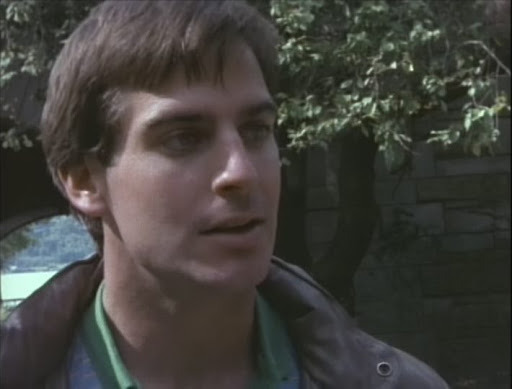
^[sidebar: I very much do not like Robert]
Part of the play ends with Walter being asked what it was like at that time, Walter asks the main characters to name someone they know, they give a name, he says “they’re dead. Give me another name, he’s dead”. For what felt like minutes, name after name after name is called and name after name after name is dead. When I saw that scene I broke down in the theater, I cried for the entirety of the walk back to the train station, I was brought to the brink of tears at the thought of that scene for a month after I saw the show.
I mention this because it was all that I could think about while watching Robert and Michael interact with one another, while seeing this plot unfold. Robert fleeing New York while Michael stayed to care for his dying friend. Knowing that Walter and Henry stayed together after all was said and done, after Henry had stopped running from reality, and the death rates had slowed; then seeing Robert decide not to go to Africa, and how Michael did not show any signs of planning to break up with Robert knowing, despite knowing how Robert felt too settled, how Robert had chosen to go, despite knowing that Robert was running from loss, and running from being a support for Michael when the love of his life finally dies.
So despite the fact that Parting Glances didn’t evoke the same feelings, though I felt like overall it was a relatively upbeat, uptempo, gentle film, the current underneath it all, the dying underneath it all, the tragedy is right there but it is just out of reach.
Favorite Scene
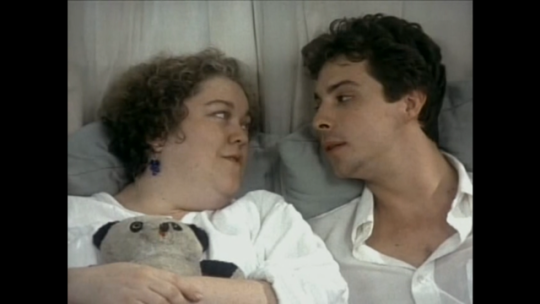
I think my favorite scene is when Joan and Michael are laying in bed together, holding stuffed animals at Robert’s going away party while they just casually talk about death and dying. It just felt very much like a conversation I have had with my best friend on multiple occasions, especially lately because we've had a number of deaths happen in our lives recently. And yes, my friend and I both match the type of conversation part this scene, and also the beating each other up with stuffed animals part of this scene.
Obviously we do not spend enough time with the other characters at the party to know exactly what is going on in their lives, and there is not doubt many if not all of them have lost loved ones to AIDS, but we know that Joan and Michael are really the only two people who go and visit Nick, and it feels so symbolic of the weight that they are shouldering caring for their dying friend to have the only two people who have not cut themselves off from Nick be sitting together, in another room away from all the other gay attendees, discussing, speculating, joking about death.
Favorite Quote
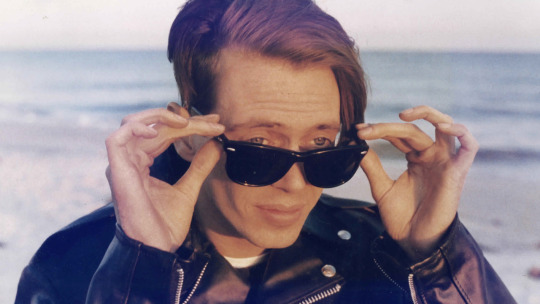
We all know the real right answer is: “Straight men are jerks. Gay men are jerks. Straight women are jerks. That leaves lesbians and they are off in their ivory towers laughing their heads off at the rest of us. I should’ve been a dyke”
But I am going to go for the more serious:
“...look at the others, waiting, wondering if some innocent moment of pleasure long past can set them up with the ultimate form of [German word my subtitles did not state]... I’d like to stage a piece in which all of the performers are people who are terminally ill, can you imagine the intensity, the concentration, the purpose”
This is said off-handedly in a conversation between Joan and a heterosexual male artist who was attending the party. I put it here for two reasons: a) the first half is a very succinct commentary on the state of the queer community (at least who were at the party) and feels like general commentary about the movie’s premise as a whole. Especially because Nick talks about how he didn’t realize how long the gestation period of HIV was, and by the time he started taking protective measures it was already too late. b) because the second half is just the most pretentious, absolutely mindless, careless, and shitty thing to say to someone who is actively losing a friend to a terminal illness. This fucking hetero artist came in to a room full of queer people and decided that dying people would be great to put in to his next project for ~The Vibes~ and I love that comment so much because first, it shows how much he Does Not Get It, and second because of how much disgust is baked in to Joan’s “Excuse me” as she leaves before he can finish his thought.
Because to say that to someone who is watching loved one after loved one after loved one die before their eyes is an absolutely disgusting thing to do (in my opinion).
Final Score
8/10
Up next, Philadelphia (1993)
#bengiyo queer cinema syllabus#queer cinema syllabus#parting glances#parting glances the movie#parting glances (1986)#unit 4: heartbreak alley
27 notes
·
View notes
Note
I’m watching OLD bls this month and I’ve almost finished “SOTUS”
And ok yea colour theory I’m sure is abound HOWEVER DRINK THEORY?!?
Arthit trying the Americano after he is confused about his feelings after Kongs confession and asking his friend “how can you even like this?”
And his friend replies “you don’t need a reason to like something, if you like it you like it”
Then Kongpob trying to order the Pink milk. But still letting Arthit have it when they don’t have enough left and they are both not on speaking terms anymore since Kongpobs confession.
And it’s not untill they are both sure of their feelings after their talk and confession in episode 13 that they finally get their orders (each other’s drink orders successfully)
Kongpob- Arthits usual pink mill
Arthits - Iced coffee
Like…. I’m not skilled but I notice the VERY OBVIOUS drink messages.
Perhaps I’ll start a blog about drink theory 😂
Anon, don't joke. This drink theory is SERIOUS BUSINESS! Pink milk is for the gays, so you need to expand on this. Do it! I didn't write thousands of words on The Eclipse and KinnPorsche making the safe space a cafe for shits and giggles.
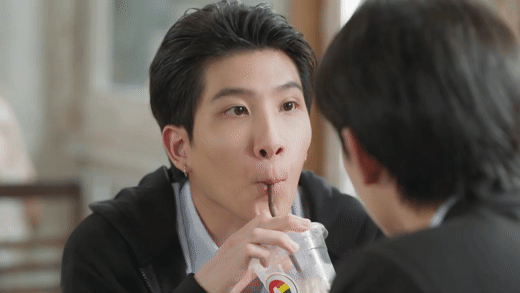
If you watched Until We Meet Again, there was an entire thing between Win and Team about Win's drink order. Team couldn't get it right, then he did, and it was symbolic of their relationship and accepting the complications of it.
In Past-Senger, Kiew comes into the future and comments on the coffee drinks being too sweet, and Bamee tells him he has old-school thinking by wanting everything to be "traditional." Kiew wasn't used to modern life (being out - this comes up in several other ways), but Bamee was never "in" so the drink conversation was another layer on modern ideas of queerness.
A Boss and a Babe with that entire "Boss, drink whatever I put in the cup!" back-and-forth between Gun and Cher!
I haven't even watched Don't Say No but I know the brother kept stalking his guy at that cafe and the drinks were a part of it, so there is something there!
Oh, and Dark Blue Kiss with Mork accepting his queerness through his acceptance of coffee.
EDIT: @waitmyturtles pointed out the drinks in The Eighth Sense were symbolic too because the country boys didn't like the Americanos but drank them anyway; then the drinks at the bar represented their relationship.
DO IT!
Some blog name suggestions - Lactose AND Tolerant. Got Pink Milk? Chai There. Mojito Mo' Problems (where you can document the use of alcohol in BLs as a plot point - I have a large collection of GIFs if you need them). Fruit Punch. BL Bes(t)Teas.
And you can expand it to metaphorical food in general! Japan owns this subject, honestly.

Naked Dining is using food as a metaphor EVERY SINGLE EPISODE. If a character likes his food spicy or not. What people's preferences are. That tastes can evolve. It's a whole thing!
Old Fashion Cupcake. IT'S IN THE NAME! Togawa teaching Nozue to eat and ENJOY sweets which he was too afraid to do before because he felt he was too old to try new things and believed sweets weren't for him = QUEERNESS!
What Did You Eat Yesterday?, Our Dining Table, She Loves to Cook, and She Loves to Eat, Until We Meet Again (Pharm x Dean), and Step by Step (but it's not as heavy as the others) could all be used too.
There was a queer series of movies in the early 2000s, and it was called Eating Out (sexual pun + queer pun intended), and this would be the PERFECT blog name for analyzing metaphorical food in BLs.
DO IT!

#pink milk is for the gays#metaphorical food and drinks#drink theory#sotus#sotus the series#it's about learning to accept one's queerness
31 notes
·
View notes
Text
Multiracial Companionship: To Wong Foo, Thanks for Everything! Julie Newmar
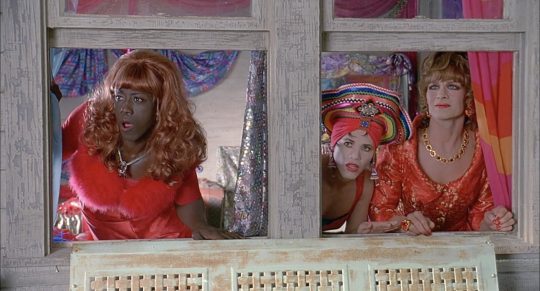
Saddled with potentially one of the most verbose and ridiculous titles in cinema history, To Wong Foo, Thanks for Everything! Julie Newmar is the campy romp of three New York City drag queens, played by Wesley Snipes, Patrick Swayze, and John Leguizamo who find themselves stranded in a midwestern town after their car breaks down on their way to Hollywood to compete in the Miss Drag Queen of America Pageant. The girls take the town by storm, form wholesome friendships with the classy ladies of Snydersville, Illinois (makeover alert!), navigate tensions with the town’s law enforcement, and chaos and glitz abound.
To Wong Foo represents an imagining of the multiracial buddy movie interested largely in the compartmentalization of identity categories with a concerted interest in gender and sexuality and a resistance to intersectional understandings of identity categories. The main characters being White, Black, and Latino is a fact the film acknowledges with the cinematic ideal of a post-racial U.S.--most importantly, To Wong Foo reminds us, the girls are drag queens, and their racial positionality comes second. The hierarchical ordering of their internal differential social orders that imbue their embodiment firstly with sexuality and gender rather than race comments on the film’s attempt to make a film by and for queer people in response to the growing conservative fear of a departure from traditional values and attempts to largely overwrite race.
youtube
My inspiration for the script came from watching the religious right videotape The Gay Agenda. There’s a scene where they show drag queens going through a town, and the narrator is warning viewers that these people will take over your town, and I thought, ‘Well, that would be fun.’
-Douglas Carter Beane, Screenwriter, To Wong Foo, Thanks for Everything! Julie Newmar
In, “The Black Image in Protective Custody: Hollywood's Biracial Buddy Films of the Eighties,” Guerrero explains that black people “appear on the screen in the 1980s predominantly in the biracial ‘buddy formula,’ which reveals all the strategies by which the industry contains and controls the black filmic image and conforms it to white expectations.” Noxeema, the film’s main Black character played by Wesley Snipes quips about Blackness and her status in this small town is effectively placed in the protective custody of whiteness, severed from the Black community surrounded entirely by non-Black people and at an increased risk of violence in this small town. She at one point jokes that "the last Black person to stay [in this town] was Sam Cooke," a prolific Black soul artist who was famously murdered in a motel.
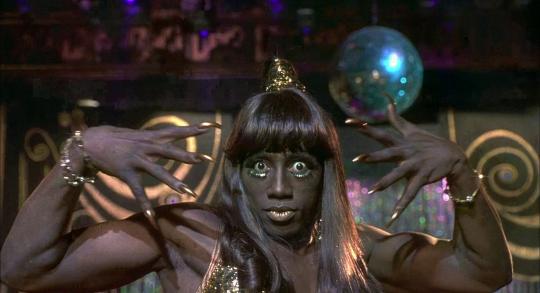
The racial tensions in the movie are tonally consistent with the film's self-aware insistence on its own levity, poking fun at itself and acknowledging racial and gender regimes, but ultimately suggesting they can be overcome.
Noxeema: You and your causes! Look, that child is Latin. You don’t want to get mixed up in all that Latin mess. She might turn out to be a Sandinista or something.
Vida: Noxeema Jackson! I have to admit that I am shocked and just a little bit saddened by you. I mean you of all people. Hon, I remember the first time I laid eyes on a certain ebony enchantress in the rough, and how through styling and the occasional makeup tip I helped her look a little bit less like Moms Mabley. And who would think that ebony enchantress would one day share a title with moi.
In an atmosphere where whiteness is presented as the absolute authority, the exchange fails to fully present itself as an examination as racism among people of color and ultimately portrays Vida, who is white, as the gatekeeper of Noxeema's successful identity as a drag queen.
To Wong Foo, ultimately, is optimistic about the possibilities for a multiracial, post-gender regime world--it imagines a world where drag queens take over the town and racial tensions can be assuaged with the power of friendship. It mostly neutralizes race as a factor in the marginalization of the girls, and its depiction of state violence at the hands of an idiotic, bumbling sheriff who is scared of change holds a mirror to conservatism and distorts it like a fun house in return.
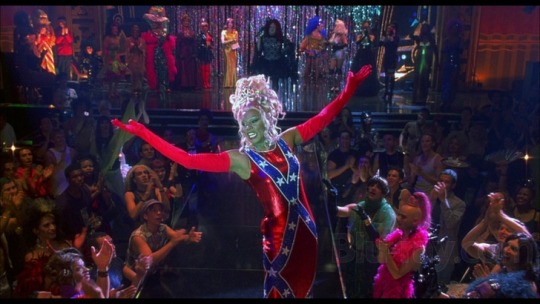
youtube
Questions:
How does the film's casting of three mainstream straight, male actors as drag queens contribute to the racial and gender politics of To Wong Foo?
What might the levity of the film regarding racial and gendered violence contribute to it?
How does drag as a performance art relate to racial embodiment in general? How might it play into the film specifically?
18 notes
·
View notes
Text
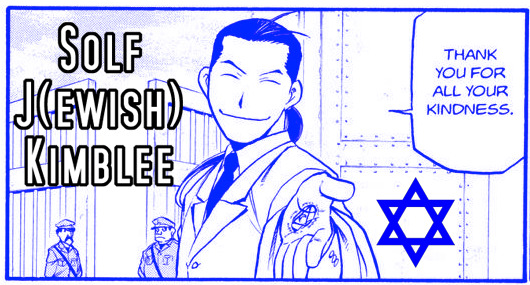
I've decided to make a masterpost of Kimblee's Jewish coding complete with FAQ so I can refer to it whenever necessary and also hopefully so people will stop goywashing him.
Goyim, I'm asking you Nicely, please read and consider before dismissing, because y'all like to reject Jewish opinions instinctively before consideration. Many sources and links abound, so a worthwhile read even just to educate yourself on Jew-Coding.
It's long but I promise, it's worth it.
I'm gonna start head to toe and begin with intent, because this is where people immediately become dismissive.
"Did Arakawa intend for Kimblee to be Jewish?"
The answer is yes and no. You first need to understand what coding is. This article on Jew-Coding is important to read to understand first. Jew-Coding is often used negatively, but surprisingly often unintentionally. This is because Jew-Coding has been present for... well, forever. Because of this, it's deeply ingrained into society. What started off initially as an intentional way to convey to audiences a villain should be read as a Jew, is now associated with villainy often without the immediate connection; however, that does not mean it is not Jew-Coding. This is also still extremely prevalent in queer coding WRT villains as well. It's important to recognize that almost all media has antisemitism baked into it, because unfortunately almost all performance and literature used antisemitic Jew-Coding in the past, and it is part of the inherent culture.
Arakawa is an artist, and like most artists she uses visual cues to convey a message or characterization for her audience to understand a character before they truly meet them. If you think of a stereotypical villain, many features may come to mind and... they often come from Jews.
Keep in mind Arakawa is a Japanese person writing about a time and place she did not inhabit. I don't think its beyond a stretch of the imagination that when researching early 1910s Germany and UK, to find what you believe a villain to look like to the people of that time and place. What propaganda do you think she came upon that was relevant in that time period that could have helped shape her perception of what a Bad Guy looks like in that environment?
Kimblee is specifically similar to Ashkenazi Jews, "are usually depicted as having large hook-noses and dark beady eyes with drooping eyelids". Arakawa does not shy away from these features. She does not make him grotesque or ugly, but it is undeniable she uses these traits to illicit an immediate assumption about his character; she even states herself she wanted to make his face look "sleazy and untrustworthy", another stereotype of Jews. In addition to that, Jews are often portrayed as having hooded/half lidded "drooping" eyelids and eyebags (which are often real Ashkenazi traits) and were called "sleepy eyed Jews" derogatorily. In fact these traits were even used by nazis to identify Ashkenazim.
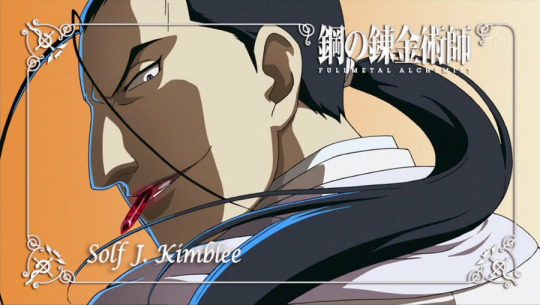
I don't say this with the intent of demanding that Arakawa is a nazi or even antisemitic, merely that she utilized visual story-telling to create an untrustworthy or shady character immediately- but the visuals she used, yes, come from a history of associating Jews with crime.
When Kimblee is drawn with the stone, it's not hard to see the similarities to Jewish stereotypes of greed. The idea that Jews will kill others for gold coins or money is almost always accompanied by imagery of coin pondering and admiration. It is not a stretch by any means to notice the similarities here.
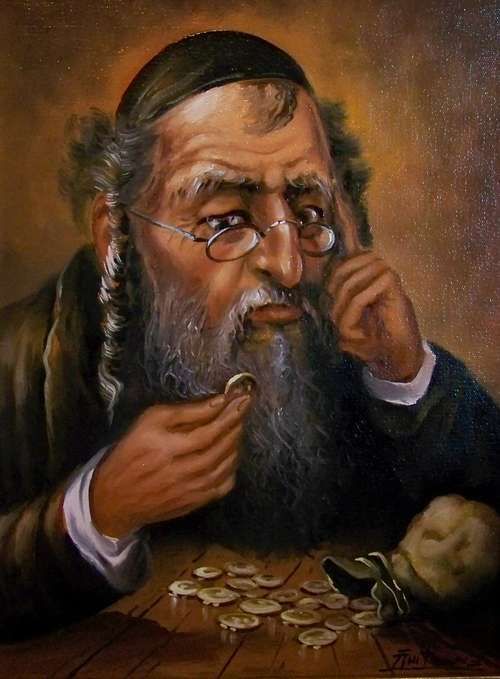
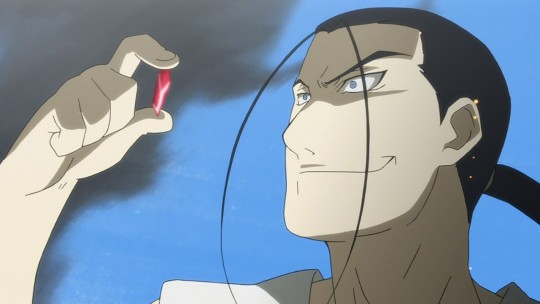
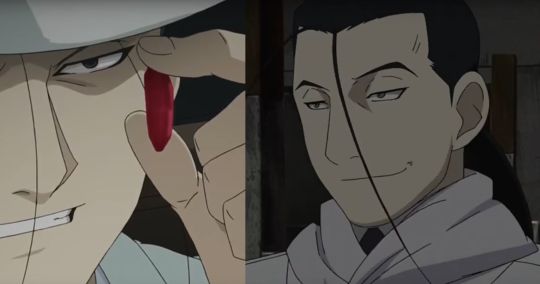
It's worth noting also that, unfortunately, this method works. Often you will see people denounce Kimblee as "ugly", but when you press for what about him is ugly, it's hard to find reason that doesn't play into the above. For this reason, I actually find it rather offensive when people try to erase these traits. Just because they were used for a bad reason, doesn't mean he doesn't have them. Just because they are often weaponized against Jews, doesn't mean we don't actually have these features. To remove them is to attempt to cleanse us of our ethnic identity as you've felt it's been dirtied, but that isn't true. I think by now we should know that removing ethnic traits, for any reason, is unacceptable.
"Is that all his Jewish coding is?"
No! Actually, Kimblee has more Jewish coding than even that. Outside of his features, his given name (Solf) is Hebrew in origin.
His personality too, can be considered quite Jewish. Jewish people are stereotyped as often playing devil's advocate, answering questions with questions, and often complaining (Kimblee is seen complaining often about having to work, getting his clothes dirty, having places to be, etc.). He is also seen as someone who sits on the sidelines, doesn't choose a side, is for his own benefit. This stereotype is heavily associated with Jews in the west, as we are seen as having "dual loyalty", and will always forsake any birth country for Israel.
Additionally, his alchemy and the way his technique can also be interpreted as Semitic.
Firstly, his alchemy is tattooed on his hands. Hands are important symbolism for Jewish characters. You'll often see stereotypes of Jewish characters clapping or clasping their hands together, or wringing their hands. This plays both into the importance of hands and hand signs in Judaism, but also stereotypes of Jews, relating to the hands coming together as a sign of greed or bringing misfortune on others (Kimblee claps his hands together to cause immediate destruction). The hamsa also adds another layer to this.
Kimblee's alchemy symbology uses a hexagram (the star of David) as well as a sun and moon, which are intrinsic to the Kabbalah, or Jewish mysticism. The Kabbalah is used in FMA for various reasons, the tree of life is hugely symbolic. Kimblee's alchemy utilizes the sun and moon, which I've already explored for it's other meaning into his character, but notably the Hebrew calendar used both the solar and lunar calendars. It isn't significant, but it's still fun to note.
"The elephant in the room though is that Kimblee committed genocide, shouldn't that revoke his Jew Card?"
Honestly? No. Kimblee's Jewishness should not be erased because of the above.
Yes, he did. But keep in mind that he exists in a world unlike ours, where the Shoah did not occur, and in theory he has not been subjected to antisemitism (though, it would be an interesting character exploration if he had been, and still chose to do this). We have to be able to recognize important character coding in media that is used for the audience response, and accept that within it's respective universe, it may not have the same application. We, the audience, recognize Kimblee's Jewishness, but that doesn't mean within the world he lives he experiences the same things Jews do in our universe.
I'd like to remind everyone that the Ishvallan's are notably Muslim, and at the expense of touching very lightly on a political issue, that you can draw your own conclusions from that re: Palestine. What I'm saying is, even within our own universe, Jewish people are not immune from war crimes or bigotry. Just look at Ben Shapiro.
I don't want to use bad actions to revoke Jewishness, because that isn't how it works in the real world, and it shouldn't be that way in the fictional one. We cannot exist demanding only the purest and cleanest representation, because to do so is to dehumanize. Whether Kimblee is a good person or a bad person, he is still Jewish.
Reclamation is a powerful thing. It allows marginalized groups to take back things that have been used to hurt us, and love them for being part of us. We have that right.
The queer community is often allowed to do this without criticism; Poison from Street Fighter is seen as a trans icon now, despite her origin being explicitly transmisogynistic. Trans and cis allies alike celebrate her transness.
Then I ask, why is it not the same for Jews? Why is it when we speak about characters that are importantly Jewish, we are denied this? We are told that we're just projecting, that it's just a headcanon, that we see Jewishness in too much of the world, when Jewishness was stolen and co-opted into the very things we mention? The truth is, people either see Jewish as only a religion they equate to another form of Christianity, or feel uncomfortable with the concept of a character being Jewish.
I have experienced gentiles who know little about being Jewish tell me what being Jewish means, what is and isn't antisemitic, what is and isn't Jewish- we are denied even the right to take what is ours. The purpose of this tangent is to make you think before you have a reactionary response and say "well Kimblee can't be Jewish!" Well, why can't he? Why are you so opposed to him having an ethnic identity like that? If you are that resistant to accepting a character's Jewishness, that is something you must address within yourself.
(I may come back to add more/more sources later but yeah. you know.)
121 notes
·
View notes
Text
Confessions of the Fox by Jordy Rosenberg
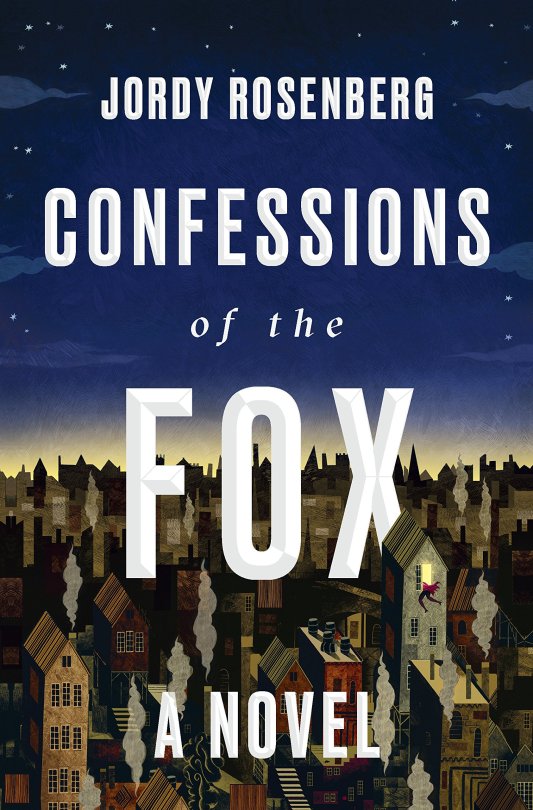
Set in the eighteenth century London underworld, this bawdy, genre-bending novel reimagines the life of thief and jailbreaker Jack Sheppard to tell a profound story about gender, love, and liberation.
Recently jilted and increasingly unhinged, Dr. Voth throws himself into his work, obsessively researching the life of Jack Sheppard, a legendary eighteenth century thief. No one knows Jack’s true story—his confessions have never been found. That is, until Dr. Voth discovers a mysterious stack of papers titled Confessions of the Fox.
Dated 1724, the manuscript tells the story of an orphan named P. Sold into servitude at twelve, P struggles for years with her desire to live as “Jack.” When P falls dizzyingly in love with Bess, a sex worker looking for freedom of her own, P begins to imagine a different life. Bess brings P into the London underworld where scamps and rogues clash with London’s newly established police force, queer subcultures thrive, and ominous threats of an oncoming plague abound. At last, P becomes Jack Sheppard, one of the most notorious—and most wanted—thieves in history.
Back in the present, Dr. Voth works feverishly day and night to authenticate the manuscript. But he’s not the only one who wants Jack’s story—and some people will do whatever it takes to get it. As both Jack and Voth are drawn into corruption and conspiracy, it becomes clear that their fates are intertwined—and only a miracle will save them both.
An imaginative retelling of Brecht’s Threepenny Opera, Confessions of the Fox blends high-spirited adventure, subversive history, and provocative wit to animate forgotten histories and the extraordinary characters hidden within.
#confessions of the fox#jordy rosenberg#transmasc#trans book of the day#trans books#queer books#bookblr#booklr
20 notes
·
View notes